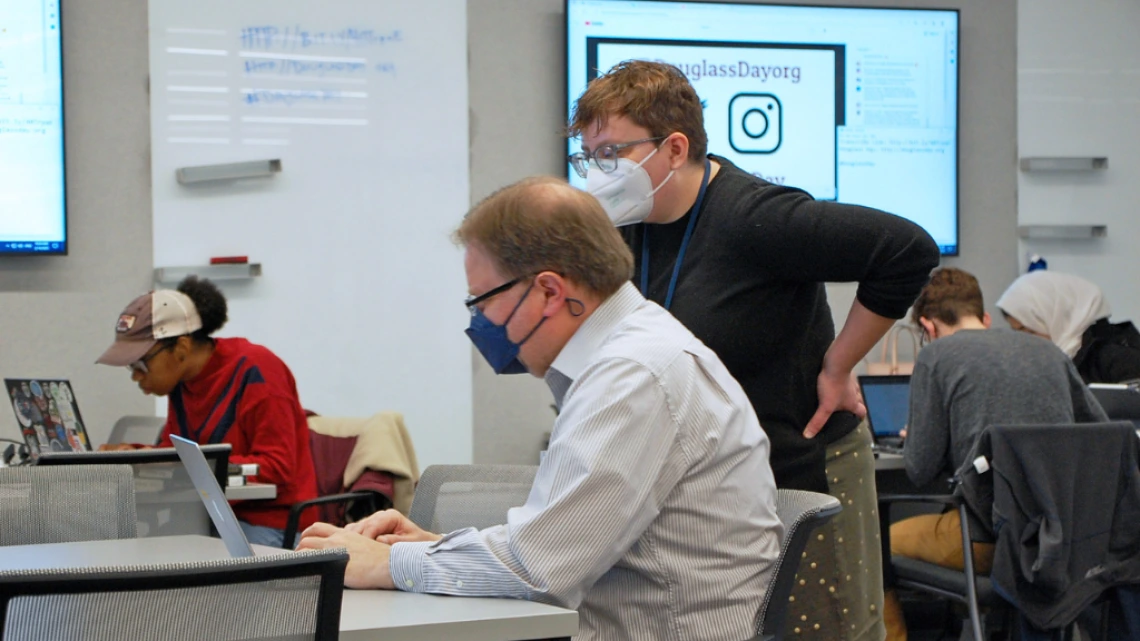Students, staff, faculty joined UArizona's first Douglass Day event

University Libraries Dean Shan Sutton (seated) and Heather Froehlich at Douglass Day 2023
On Tuesday, February 14, volunteers participated in a nationwide transcribe-a-thon known as “Douglass Day” – named in honor of Frederick Douglass, (1818-1895), American abolitionist, social reformer, orator, writer, and statesman. February 14 was Douglass’ chosen birthdate.
Douglass Day is a collective action for Black history, during Black History Month, that brings thousands of participants together, both in-person and online, at more than one hundred simultaneous events to transcribe materials of Black scholars and thinkers.
Transcribing physical materials into a digital form preserves the work and increases its public accessibility. Each year a different historical figure is chosen; this year it was Mary Ann Shadd Cary, the first Black woman publisher in North America, the first woman publisher in Canada, and the second Black woman to attend law school in the U.S. before becoming involved in the women's suffrage movement and advocating for the 14th and 15th Constitutional Amendments.
Event organizer Heather Froehlich, Digital Scholarship Specialist in University Libraries Research Engagement, brought Douglass Day to UArizona for many reasons. “I was involved in Douglass Day at my previous job at Penn State University. I thought this would be a nice way to bring folks together over a shared goal of helping make Black history more visible,” Froehlich said. At Penn State, Heather supported quantitative text analysis and digital humanities scholarship. In other words, "I support researchers [then and now] who want to develop and implement research projects using computers, especially telling stories about collections of data." She's been at the University Libraries for five months.
“The people we've focused on in the past, such as Mary Church Terrell and Anna Julia Cooper, are such significant figures in North American history. I was struck by how important these women are, but I was also struck by how little I had known about them without having someone championing them like this event. It feels so important to bring these under-represented figures to the forefront of our historical consciousness. Events like Douglass Day help elevate their importance to history, while also making history fun – a win-win,” Froehlich said.
Hosted in CATalyst Studios at the Main Library, about ten people joined between 10 am and noon. "I suspect we had another 20 or so participating online," Froehlich said. "It's great that you can do the transcribing from virtually anywhere." Volunteers were asked to dedicate 15-20 minutes to transcribe the materials, yet most chose to stay longer. “I was happy to see so much interest from the UArizona community, especially for the first time we had an event like this.” To date, volunteers have completed almost 30% of Mary’s collection, "so there are still opportunities to participate if someone didn’t have a chance to join us last week. It’s a great activity when winding down for the day.”
As for continuing the event at UArizona next year, “I hope we do!” she said. “I'm eager to learn who the Douglass Day planning team will focus on next. Every year I've been involved, I've learned more about someone new. It's really satisfying to know we're part of something bigger than just at the UArizona campus or just in Tucson. There are a couple thousand people across the U.S. and beyond looking at the same collection of materials, all with the common goal making these records more accessible to a wider audience. I love the community element of that.”
